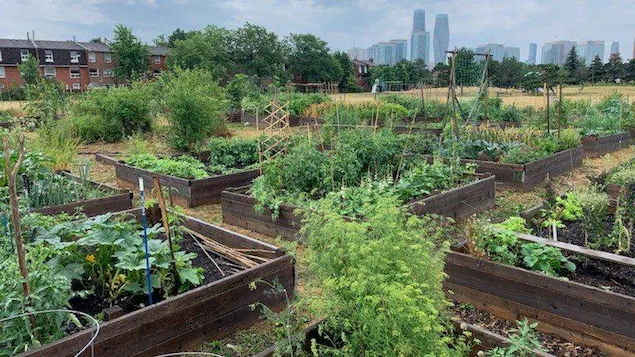Other cities in Ontario such as Toronto or the Durham region have, for years, adopted this form of farming in which urban space is reclaimed by volunteers to produce local food.
Kara Bullock is a Mississauga-based climate change specialist. She points out that there is very little suitable land for urban agriculture in Mississauga, but on the other hand there is Unused city spaces such as rooftops, lawns, and commercial facilities
which can be used to develop urban farming projects. The hardest challenge to overcome is to get to the ground
as you say.
The policy of urban farming in Mississauga in large quantities:
- Strengthening networks and building relationships between segments of society and all levels of government.
- Promote urban agriculture through policies and regulations and facilitate equitable access to land. One of the community’s actions as part of this journey is to work with the city to identify growing land and space for urban farming based on the community’s needs and interests.
- Support a variety of urban farming opportunities by exploring financial and non-financial instruments. The role of the community will be to guide and train people to support community innovation and entrepreneurship.
Community gardens existed in Mississauga long before the city’s action plan. We build on our existing community gardens
Mrs. Bullock explains. In her opinion, this was a good basis for launching this policy. One of the main actions is to develop more community gardens and increase the capacity of the community garden program [existants] from the city
as you say.
In addition, the Mississauga municipality works with Ecosource, a local non-profit organization that promotes environmental education. 15 years cooperation.
Kat Gibson has been in the responsible food business for a decade. And at Ecosource, she served as the community gardening program coordinator for five years. She explains that she and her team participated in a consultation process to support the development of Mississauga’s local food policy. We are so excited
as you say.
Ms. Gibson adds that the demand for community gardens in the Mississauga area is very strong. We may have more than 2,000 people on the waiting list to get their plot of land in a community garden
explains the woman who owns a fruit and vegetable garden on her balcony in a Toronto apartment.
The City of Mississauga hopes that its urban agriculture program will help combat food insecurity in the community; Especially in marginalized groups.
Mississauga Food Bank Usage Increased 14% in the Last Year
says the city’s climate change specialist.
” Emergency food bank use increased by 167%. »
Community Gardens Financing
Combating food insecurity also includes supporting community gardens, according to some stakeholders in the sector.
Ran Joel, Founder Fresh City Farman urban farm just north of downtown Toronto, advocates for it Community gardens and small commercial urban farms
Receive more government subsidies.
Kat Gibson of Ecosource explains that community garden programs can find themselves in a precarious situation due to a lack of subsidies. Having years of ongoing scholarship is an ongoing challenge
she explained.
” From year to year, we must generate leads regularly by seeking funding sources in order to continue to operate Community Gardens. »
Gibson hopes to see change through the city’s new urban agriculture strategic plan for the city of Mississauga.
Other municipal models that frame urban agriculture
Municipalities such as Oshawa and Toronto are giving way to urban farming.
The city of Oshawa has a number of community gardens run by volunteers who are members of the community organization Durham integrated growers (DIG), which supports urban farming in the Durham region, which includes Oshawa.
Adrian Hoogendoorn is one of them. We connect different urban projects
he explains. We have 21 members. Community gardens and pollinator gardens
adds the man who now lives on the family farm in Frankford, a village in Quinte Quest, Ontario.
I left Durham in April 2021 due to the pandemic but also to take care of my elderly parents
, he explains. However, planting enthusiasts remain active in the Durham region’s community garden network.
” with drillingWe provide information. We represent them before various levels of government to try to improve urban food enterprise policies. »
A former public school teacher in Oshawa, he introduced his students to urban farming. It was a biodiversity project. We even had a cooking club. The project lasted 10 years and was stopped during the epidemic
he explains.
For Mr. Hogendoorn, the challenges of community gardening can be the same. Many people are interested. The challenge is to keep people engaged
he thinks.
Ten years ago, the Toronto City Council adopted an action plan to create a framework for developing the potential of urban agriculture in Toronto.
Sean McIntyre, director of the city’s office of poverty reduction strategy, social development, finance and management, says The city of Toronto strongly supports urban agriculture
. He adds that this is one of the many ways Towards food security, food sovereignty and community development
.
McIntyre says Toronto was the first North American city to implement a green roof system in 2009. This law requires development [de toits verts] On buildings that are larger than a certain size
-Can we read in the note sent by email.
However, he acknowledges that there is no Currently only a few parks operating on the city’s rooftops
.

“Alcohol scholar. Twitter lover. Zombieaholic. Hipster-friendly coffee fanatic.”



